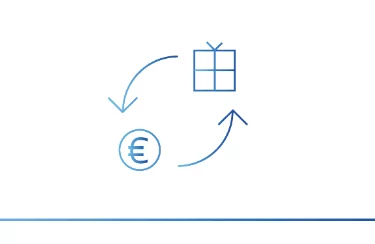Added value through targeted investmentsInterim Manager daily rates
Hiring an interim manager is a strategic decision for many companies in order to overcome short-term challenges and secure long-term competitive advantages. A key aspect of the collaboration is determining an appropriate daily rate for the interim manager. This varies greatly and is influenced by a variety of factors – from the manager’s experience and the size of the company to the industry and regional market environment. A clear picture of the influencing factors is crucial in order to determine a fair and comprehensible interim manager salary.
This article sheds light on how interim managers’ daily rates can be determined, what role market standards and negotiation strategies play and why it is often worthwhile for companies to invest in this expertise. At the same time, it highlights the risks that arise when qualified interim managers are not used – and the sustainable benefits they can offer companies.
Table of contents
Factors influencing the daily rates of interim managers
The daily rates of interim managers vary considerably and depend on several influencing factors. These factors are crucial in determining the level of remuneration and ensuring that rates are based on specific market conditions and requirements.
Professional experience
The professional experience of an interim manager has a significant influence on the daily rate. The more extensive the experience, the higher the daily rate can usually be set. Entrepreneurs and organizations tend to prefer experienced managers as they often have in-depth knowledge, proven strategies and an extensive network. These factors not only increase the efficiency of the work, but also minimize the risk of wrong decisions. Consequently, experienced interim managers usually bring higher fees as they are able to quickly and effectively develop solutions to complex challenges.
Company size
The size of the company is also important when determining the daily rates for interim management. Larger companies often have more complex structures, larger teams and more extensive areas of responsibility that place special demands on management. In this case, interim managers with extensive experience and specific skills are usually in demand. As a result, larger companies are more willing to pay higher daily rates to ensure that they recruit the right managers for their specific needs. In smaller companies or start-ups, budgets are often more limited, which can mean that daily rates are correspondingly lower.
Geographical location
The federal state in which the interim manager works also has a major influence on the daily rates. Prices tend to be higher in economically strong regions, such as large metropolitan areas or industrial centers. These areas generally offer more assignments and requirements for qualified interim managers. In contrast, rates may be lower in structurally weaker regions where there is less competition for experienced managers. It is therefore important to analyze the local market situation to determine the appropriate pricing for an interim manager salary.
Industry
Finally, the industry in which the interim manager works plays a decisive role. In fast-moving sectors, such as technology or financial services, daily rates can be higher in order to meet the specific requirements and dynamic changes in the market. In addition, there are industries that are highly regulated, such as healthcare or pharmaceuticals, where experts with specific knowledge are required. This expertise is often scarce, which drives up daily rates even further. It is therefore essential to take industry-specific criteria into account when setting realistic and competitive daily rates for interim managers.
Average values for interim manager daily rates and 1% rule of thumb
When determining daily rates for interim managers, it is helpful to consider the average values within the industry. These values provide valuable guidance and can help you to plan an appropriate budget. A common method for estimating appropriate remuneration is the 1% rule of thumb. According to this rule, the net daily rate of an interim manager corresponds to around 1% of the gross annual salary of a comparably qualified permanent employee.
This simple formula enables companies to make an informed decision about paying a fair interim manager salary. However, you should always take into account the individual requirements and the respective project environment. A balance between quality and cost is crucial in order to get the most out of working with an interim manager. The DDIM (Dachgesellschaft Deutsches Interim Management) assumes approximate daily rates of between 1,200 and 1,400 euros.
—
Transparency and negotiation of daily rates in interim management
Setting daily rates for interim managers is a sensitive process that requires transparency and negotiation skills. In an increasingly competitive business world, it is crucial that both companies and interim managers develop a clear understanding of market rates. Transparent communication about the qualifications, experience and added value offered by the interim manager helps to create a comprehensible basis for price negotiations.
It is advisable to clarify expectations and the budget at an early stage in the meeting. The interim manager should emphasize their specific skills and previous successes in order to confirm the requested daily rate. At the same time, it is important that companies are prepared to pay appropriate fees that reflect market conditions and recognize the interim manager’s expertise. This balance between transparency and negotiation not only builds trust, but also promotes a long-term collaboration that is beneficial to both parties.
When a lack of leadership is more expensive than interim manager daily rates
The decision to hire an interim manager can be crucial for companies – especially when it comes to overcoming short-term challenges or driving strategic change. The added value that interim managers offer is often considerable and cannot be measured in daily rates alone. These professionals not only bring extensive experience and expertise, but also a fresh perspective on existing processes and structures. Their ability to quickly immerse themselves in new roles and adapt to the specific business situation means they can deliver immediate results and increase efficiency.
Interim managers also enable a flexible cost structure: they can be hired for specific projects or periods of time, which promotes precise budgeting. Companies therefore benefit from a high degree of adaptability without long-term commitments. Ultimately, investing in an interim manager is not just a question of the daily rate, but rather a strategic decision that can ensure sustainable improvements and competitive advantages. The costs of not engaging an interim manager are often considerable and can be seen in various areas:

Production site without management
A company that does not have a qualified production manager risks production bottlenecks and inefficient processes. This situation can, for example, lead to delivery promises not being met. Customers lose confidence and may look for alternatives. The long-term impact on sales and brand image can significantly exceed the cost of an interim manager’s salary.

Lack of HR expertise
An HR department without recruiting experts may have difficulty finding qualified personnel. This can lead to delays in processing orders because the company does not have the necessary resources. Failure to fill critical positions also often results in an overwhelming workload for existing employees, which affects productivity and employee satisfaction and encourages higher turnover rates.

Missed growth opportunities
If a company in a growth phase does not hire experienced interim managers with expertise in change management and expansion, it may miss out on valuable market opportunities. Innovations may fall by the wayside, or the company may not be able to adapt quickly enough to changing market conditions. There is a risk of a significant drop in sales.

Risk management
In crisis situations, such as sudden compliance problems or financial bottlenecks, the lack of fast and qualified management can lead to costly mistakes or penalties. An interim manager can provide targeted assistance in such crisis scenarios in order to find solutions quickly and minimize risk.
To summarize, the short-term savings of not using an interim manager are often greatly outweighed by the long-term costs. It is therefore worth investing in the daily rates of an interim manager!
Interim manager salary as a strategic investment
Interim managers’ daily rates vary according to experience, industry and region, but averages provide a useful basis for budgeting. The decision to hire an interim manager pays off, as they not only address short-term problems, but also create sustainable benefits. The expertise and flexibility of these specialists secure valuable competitive advantages for companies and strengthen their position in the market – a smart investment for success and stability!
Your contacts for interim management
Fast candidate selection in 48 hours:Ready for action for your success

Projectinquiry Fill out
Tell us about your project and what kind of expert you are looking for. If your project is complex and multi-faceted, we are your first partner to present you with experienced teams.

Get connected with the right expert
Within 48 hours, we will send you pre-selected profiles that are tailored to your project requirements.

Select your candidate
The onboarding process starts with a video call with your selected expert. If you are not yet convinced by the expert, we will be happy to find the right one on request.

Our range of solutionsIncreasing performance through operational excellence
Our experts take a holistic view of your value chain and design your processes with an intelligent strategy, which is then implemented in a customized manner.











